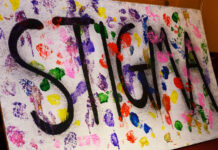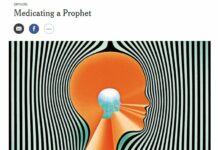“The Lizard Inside”
For aeon, Roberta Payne, a professor of literature and the author of Speaking to My Madness: How I Searched for Myself in Schizophrenia, writes...
Stigma May Increase Distress in Individuals Who Hear Voices
Review finds that stigma around voice hearing is connected to isolation, secrecy, and poorer functioning.
Safety Analysis Weighs Harms and Benefits of Antipsychotic Drugs
The researchers find that the drug effects for reducing psychosis are small and that treatment failure and severe side effects are common.
“Medicating a Prophet”
In the New York Times Sunday Review, Irene Hurford, a psychiatrist, reflects on the ethics of forced treatment for psychosis. “As doctors,” she writes,...
“Canadian Patients Fight Forced Electroshock”
"A retired nurse, a Harvard-educated musician and others sued British Columbia this week, claiming it forcibly subjects mental health patients to electroconvulsive therapy and...
Epilepsy Drugs Can Induce Psychosis in Some Patients, Study Finds
In this month’s issue of the journal Brain a new study investigates whether the drugs prescribed to control seizures can increase the risk of...
Not So Rare But Rarely Diagnosed: From Demonic Possession to Anti-NMDA Receptor Encephalitis
Throughout the ages, convulsions, contortions of the body and face, including the tongue, super-human strength, catatonic periods, long periods of wakefulness or sleep, insensitivity to pain, speaking in tongues, and a predilection for self-injurious behaviours have all been offered as physical evidence of possession. The modern day interpretation, however, comes with a plot twist befitting a media spectacle. There is growing consensus in the medical community that many prior accounts of “demonic possession” may have represented original accounts of what is now broadly known as autoimmune encephalitis.
Pilot Study Adapts Open Dialogue for US Health Care
In an article for Psychiatric Services, psychiatrist Christopher Gordon and his colleagues report on the results of a one-year feasibility study attempting to implement...
Many Psychiatric Patients Sent Home With Multiple Antipsychotics Against Guidelines
Despite the fact that clinical practice guidelines specifically recommend against the use of more than one antipsychotic at once, new research reveals that as...
Hearing Voices, Living Fully: Living with the Voices in My Head
My memoir, Hearing Voices, Living Fully: Living with the Voices in My Head, chronicles my journey through depression, psychosis, and an unmedicated recovery, and describes how I learned to challenge my demons and negotiate the conditions that allowed me to regain control over my mind and my life. Although I thought my story was very unusual, I thought it possible that many who have manifested the symptoms associated with schizophrenia could achieve a greater degree of recovery than is currently the norm. When I became involved with the Hearing Voices Network, I learned that my experience is not uncommon and that there are literally millions of people in the world who are living full lives, even while hearing voices.
Group Mindfulness Shows Promise Reducing Depression Associated with Hearing Voices
A new study out of Kings College London found that twelve sessions of a group mindfulness-based therapy relieved distress associated with hearing voices while reducing depression over the long-term. The person-based cognitive therapy (PBCT) intervention had significant effects on depression, voice distress, voice controllability and overall recovery.
Mental Health Documentary “Healing Voices” Premiers Across 130 Communities in 8 Countries
The producers of “Healing Voices” ‐ a new social action documentary about mental health ‐ are releasing the film via community screening partners in...
Exercise Effective for Early Psychosis, Studies Show
A new study out of the University of Manchester found that personalized exercise programs reduced the symptoms for young people suffering from their first episode of psychosis. Researchers also conducted an accompanying qualitative analysis and found that the participants experienced improved mental health, confidence, and a sense of achievement and felt that autonomy and social support were critical to their success.
Advice on Coping With Voices
What are some tactics used by voices, and what can you do about it? I hope the suggestions in this piece can help desperate voice-hearers become more understanding of the forces behind their agony, and perhaps bring a more enlightened perspective to the chemically-lobotomizing tendencies of their psychiatrists who treat voices with more medication.
“People with Schizophrenia Hear Voices- Their Own”
For Slate, Eliezer Sternberg outlines research suggesting that auditory hallucinations are actually “subvocal speech” produced by the patient themselves. When a schizophrenic patient hears...
The Future of Mental Health Interview Series: Eleanor Longden
The following interview with Eleanor Longden, who is well known for her Ted Talk and her activism in the psychiatric survivor movement, is part of a “future of mental health” interview series that I’m currently conducting on my Psychology Today blog Rethinking Mental Health. To see the full interview roster, please visit
http://ericmaisel.com/interview-series.
Minority Discrimination Linked to Psychosis
A study published in this month’s issue of the Social Psychiatry and Psychiatric Epidemiology found that perceived discrimination related to minority status may precede...
Watch: “I Hear Voices in My Head, But I’m Fine”
"Eleanor Longden started hearing voices when she was 18. She was drugged and hospitalised, then told she was schizophrenic. A psychiatrist even told her...
Psychiatrist Asks Field to Drop Schizophrenia Classification
Dutch psychiatrist and epidemiologist, Jim van Os, has renewed his call to drop schizophrenia as a disease classification. “Several recent papers by different authors...
Large German Anti-Stigma Campaign Shows Little Effect on Attitudes
“Overall, this study showed that the information and awareness campaign had almost no significant effects on the general public's attitudes toward people affected by either schizophrenia or depression,” the researchers, led by German medical sociologist Anna Makowski, wrote. “One could assume that deeply rooted convictions cannot be modified by rather time-limited and general activities targeted at the public.”
The Genetics of Schizophrenia: A Left Brain Theory about a Right Brain Deficit in...
In recent months, two teams of researchers in the UK and the US published complementary findings about the epigenetic origins of schizophrenia that have scientific communities who indulge in ‘genetic conspiracy theories’ abuzz. While these results are intriguing, and no doubt involve pathbreaking research methodologies, this line of thought represents a decontextualized understanding both of the symptoms that are typically associated with schizophrenia, and their causes.
Different Forms of Childhood Adversity Related to Specific Psychosis Symptoms
In this month’s issue of Psychological Medicine, researchers from King’s College London found evidence for associations between different types of childhood adversity and specific symptoms associated with psychosis. As current categorical approaches to psychosis and schizophrenia diagnoses come under increasing scrutiny, this study adds support to sociological and psychological theories and treatments.
“When the Brain is Under Attack”
The Boston Globe reports on the discovery of a newly recognized neurological disease, anti-NMDA receptor encephalitis. The disease is believed to be caused when the body’s immune system attacks proteins in the brain associated with the communication of neurons.
“Social Factors Influence Schizophrenia?”
PsychCentral covers new research linking social deprivation, population density and inequality with higher rates of psychotic symptoms and diagnoses for schizophrenia. “This is important because other research has shown that many health and social outcomes also tend to be optimal when societies are more equal.”
Duty to Warn – 14 Lies That Our Psychiatry Professors in Medical School Taught...
Revealing the false information provided about psychiatry should cause any thinking person, patient, thought-leader or politician to wonder: “how many otherwise normal or potentially curable people over the last half century of psych drug propaganda have actually been mis-labeled as mentally ill (and then mis-treated) and sent down the convoluted path of therapeutic misadventures – heading toward oblivion?”















